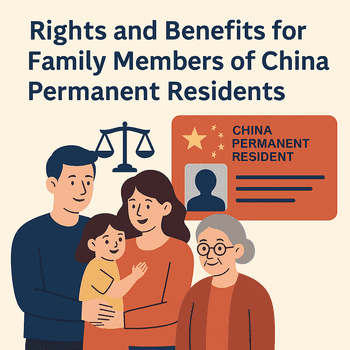
China’s Permanent Residence program offers significant advantages not only for cardholders but also for their family members.
This comprehensive guide outlines the current pathways, requirements, and benefits for family members of China Permanent Residents based on the latest 2025 regulations.
Understanding China’s Family Reunification Framework
Family reunification in China operates under the Exit and Entry Administration Law of the People’s Republic of China and the Regulations on the Administration of Entry and Exit of Foreigners.
These laws establish the framework for family members of Chinese citizens and foreign permanent residents to join their relatives in China.
Key Visa Categories for Family Reunification
| Visa Type | Purpose | Duration | Eligible Relationships | Application Location |
|---|---|---|---|---|
| Q1 Visa | Long-term family reunion | 180 days | Spouse, parents, children, siblings, grandparents, grandchildren, parents-in-law | Chinese Embassy/Consulate abroad |
| Q2 Visa | Short-term family visit | 30-180 days | Same as Q1 | Chinese Embassy/Consulate abroad |
| S1 Visa | Long-term visit to foreigners working/studying in China | 180 days | Spouse, parents, children under 18, parents-in-law | Chinese Embassy/Consulate abroad |
| S2 Visa | Short-term visit to foreigners in China | 30-180 days | Same as S1 | Chinese Embassy/Consulate abroad |
Source: National Immigration Administration
Who Qualifies as a Family Member?
Age Restrictions for Dependent Children
A critical factor is the age limitation for children.
Once a child turns 18, they are no longer eligible to apply as a dependent family member.
According to the Administrative Measures for the Approval of Permanent Residence of Foreigners in China, only unmarried children under 18 with foreign nationality whose one or both parents are Chinese citizens or permanent residents can apply for permanent residency.
Qualifying Routes That Allow Entire Families to Apply Together
There are several specific pathways through which entire families can apply for permanent residency together:
- Spousal Reunion: Foreign spouse and children with foreign passports are eligible
- Doctorate Holder: Both spouse and children may be included
- Employment-Based Residency: Both spouse and children may be included
Permanent Residence Pathways for Family Members
China has significantly reformed its permanent residence system under the Measures for the Administration of Examination and Approval of Foreigners’ Permanent Residence in China (2020).
Eligibility Criteria by Family Category
| Category | Relationship | Residency Requirement | Marriage Duration | Additional Requirements | Success Rate* |
|---|---|---|---|---|---|
| Spouse of Chinese Citizen | Married couple | 5 consecutive years with at least 9 months annually in China | 5+ years | Stable income and residence | Moderate-High |
| Spouse of PR Holder | Married couple | 5 consecutive years with at least 9 months annually in China | 5+ years | Stable income and residence | Moderate |
| Child of Chinese Citizen | Under 18 years | N/A | N/A | Dependent on Chinese parent | High |
| Parents of Chinese Citizen | Parent-child | N/A | N/A | No immediate family abroad, financially dependent | Moderate |
| Parents of PR Holder | Parent-child | N/A | N/A | Over 60 years old, financially dependent | Low-Moderate |
*Success rates are estimates based on immigration consultant reports and may vary by region and individual circumstances.
Source: China Law Translate – Permanent Residence Regulations
Rights and Benefits for Family Members
Travel Flexibility
- No restriction on residence period
- Visa-free re-entry with a valid passport and Permanent Residence ID
- Multiple-entry privileges without restrictions
Healthcare Access
- Eligibility to join the national health insurance scheme
- Reduced costs for medical services compared to international rates
- Simplified registration at hospitals and clinics
Family members on temporary visas must obtain private international health insurance, which typically costs ¥20,000-60,000 annually depending on coverage.
Educational Opportunities
| Education Level | Requirements for PR Children | Requirements for Visa Holder Children |
|---|---|---|
| Kindergarten | Same as local children | International schools or private kindergartens |
| Primary/Secondary | Can attend public schools | International schools or schools for foreign children |
| University | Can participate in national entrance exam | Separate international student admission |
| Tuition | Local rates | International rates (3-5x higher) |
Source: Ministry of Education Guidelines
Employment Rights
Family members on Q or S visas generally must obtain separate work permits to be legally employed in China.
However, permanent residents can work without work permits or employer sponsorship.
Property Ownership
Permanent residents enjoy expanded property rights:
- Purchase multiple properties beyond the one-unit limitation imposed on foreigners
- Buy property without proving one year of residency first
- Access local mortgage rates and lending options
Social Security Benefits
Permanent residents can fully participate in China’s social security system:
- Pension program enrollment
- Unemployment insurance coverage
- Maternity benefits
- Work-related injury insurance
Tax Implications
| Status | Tax Residency | Global Income Taxation | Tax Benefits |
|---|---|---|---|
| Permanent Resident | Automatic after 1 year | Yes, after 6 consecutive years | Eligible for deductions |
| Family Visa Holder | After 183 days in a calendar year | Only on China-sourced income | Limited deductions |
Source: State Taxation Administration
Application Process and Documentation
Required Documents
- Valid passport (minimum 6 months validity)
- Completed application forms
- Recent passport photos (2 inches, white background)
- Proof of relationship (notarized and authenticated)
- Evidence of continuous residence in China
- Financial stability documentation
- Health examination certificate from designated hospital
- Criminal record certificates from China and home country
Important Procedural Considerations
- Birth Certificate Requirements: Original certificates are mandatory. Foreign-issued documents need apostille or consular authentication, typically valid for 3–6 months.
- Custody Proof: In cases of divorce, if the child is applying with the main applicant, legal custody must be demonstrably assigned to the applicant.
Regional Variations in Processing
| City | Processing Time (PR Application) | Success Rate* | Local Policy Highlights |
|---|---|---|---|
| Beijing | 6-9 months | Moderate | Stricter verification but faster processing |
| Shanghai | 6-8 months | Moderate-High | More streamlined for high-skilled applicants’ families |
| Guangzhou | 8-12 months | Moderate | Additional documentation may be required |
| Shenzhen | 7-10 months | Moderate-High | Favorable policies for tech industry families |
| Chengdu | 9-14 months | Moderate | Longer processing but sometimes less stringent review |
*Based on immigration consultant reports and may vary by individual circumstances.
Recent Policy Changes (2023-2025)
- July 2023: Simplified documentation requirements for elderly parents of Chinese citizens
- December 2023: Introduction of the upgraded “Five-star Card” with enhanced security features and functionality
- January 2024: Digital application system launched in major cities
- March 2024: Expanded eligibility for spouses of high-skilled foreign talents
- January 2025: New points-based system for permanent residence applicants
Source: National Immigration Administration Updates
Digital Application Options
China has recently introduced online platforms for certain immigration services:
- Immigration Service Online Platform: Pre-application submissions and appointment booking
- WeChat Mini Programs: Status checking and appointment scheduling
- Electronic Residence Registration: Available in tier-1 cities
Expert Resources and Support
Official Government Resources
- National Immigration Administration: www.nia.gov.cn
- Ministry of Foreign Affairs: www.fmprc.gov.cn
- Local Exit-Entry Administration Bureaus (contact information varies by city)
Professional Services
| Service Type | Estimated Cost (CNY) | Benefits |
|---|---|---|
| Immigration Consultant | ¥15,000-30,000 | Full application management |
| Document Authentication | ¥3,000-8,000 | Handling of all document legalization |
| Translation Service | ¥200-400 per page | Certified translations |
| Legal Consultation | ¥1,000-2,500 per hour | Expert advice for complex cases |
Frequently Asked Questions
Q: Can I apply for permanent residence if my spouse is a Chinese citizen but we’ve been married less than 5 years?
A: Generally no, but exceptions exist for high-skilled professionals or those making significant contributions to China. Consult with an immigration specialist for your specific case.
Q: Do children born in China to foreign parents automatically receive permanent residence?
A: No. Children must qualify through their parents’ status or through separate application processes.
Q: Is permanent residence status equivalent to citizenship in China?
A: No. China does not recognize dual citizenship, and permanent residence does not confer political rights like voting.
Q: How often must permanent residence cards be renewed?
A: Current permanent residence cards are valid for 10 years and must be renewed before expiration.
Q: Can family members work on Q or S visas?
A: Generally no. Family members on Q or S visas must obtain separate work permits to be legally employed in China.



